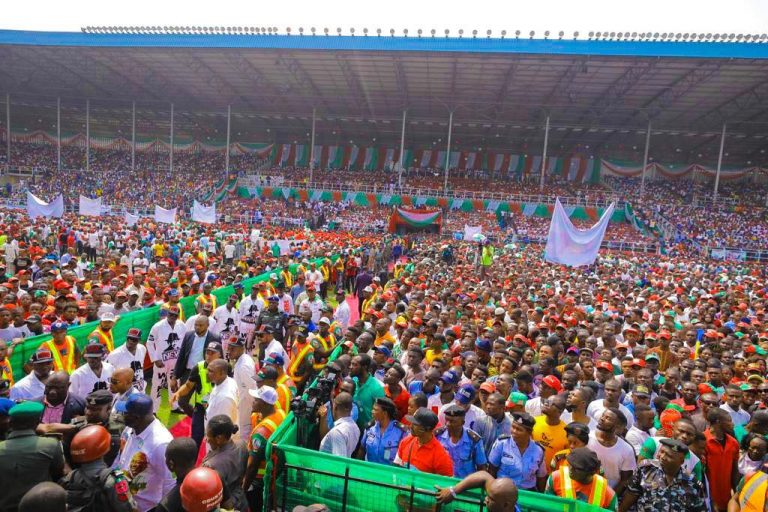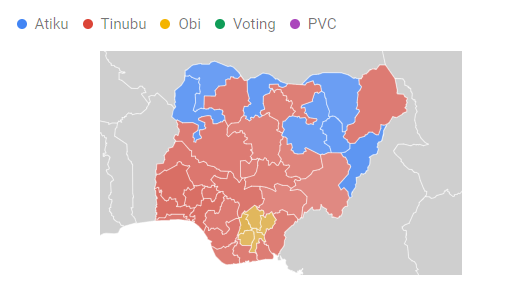
For several minutes, hours, days, weeks and months, candidates and their political parties engaged Nigerians, especially those who are eligible to vote on February 25, 2023, electing a new president, on different platforms at different places. Both the candidates and parties disseminated messages that substantiated programmes stated in their manifestos. While presidential candidates in 1999, 2003, 2007, 2011, and 2019 had opportunities to reach 54 million to 84 million voters, the 18 political parties that fielded candidates for the 2023 presidential election had the same chance of canvassing votes by reaching over 93 million voters. This is basically from the supply side of the political economy of campaigning. From the demand side, voters agreed and disagreed with the messages using different approaches towards understanding who should be voted for.
In this special piece, our analyst examines the last 7 days (February 18 to February 24, 2023) of the public’s interest in the three dominant candidates, their readiness to vote and their curiosity about collecting their permanent voter card. Our first-level analysis reveals that out of 14,989 searches during the period, Senator Bola Ahmed Tinubu, the candidate of the All Progressives Congress, had the highest percent (41.09%), followed by Mr. Peter Obi (32.47%), while Alhaji Atiku Abubakar had 16.51%. Voting had 4.55%, while PVC received 5.36%.
Public interest in the three candidates in connection with interest in voting and PVC was strong during the period. Over 70% of the interest in the candidates was found in the public’s interest in voting. However, there are differences in the percentage of interest the public had in voting and knowing the status of their PVCs after developing significant interest in each candidate. According to our findings, one unit of interest in Alhaji Atiku Abubakar translates to 21.1% interest in voting.It was 63% for Mr. Peter Obi and 5.1% for Senator Bola Ahmed Tinubu. These findings indicate that Nigerians who use the Internet are more likely to vote on February 25, 2023, based on the information they obtained from various platforms or sources.
Register for Tekedia Mini-MBA edition 18 (Sep 15 – Dec 6, 2025) today for early bird discounts. Do annual for access to Blucera.com.
Tekedia AI in Business Masterclass opens registrations.
Join Tekedia Capital Syndicate and co-invest in great global startups.
Register for Tekedia AI Lab: From Technical Design to Deployment.
Our analysis also reveals that the public interest in the candidates resonated with understanding of PVC by 64.6%. This is less than what our analyst found for voting and suggests the public’s greater aggressiveness in voting than in picking up their PVC. Meanwhile, when the public developed interest in the candidates in relation to having information about PVC, Mr. Peter Obi was more searched in connection with PVC than other candidates, especially Senator Bola Ahmed Tinubu. In our analysis, we found that one unit of interest in Mr. Peter Obi resulted in seeking information about PVC by 51.3%, while Alhaji Atiku Abubakar had 33.2%. However, one unit of interest in Senator Bola Ahmed translated to -10.1% interest in PVC, indicating insignificant interest in PVC as the public developed interest in the ruling party’s candidate.
Exhibit 1: Interest in candidates, voting and PVC by state

Candidates and Public Concerns
While the public developed interest in the candidates using different search terms and names, they were mostly directed to various sources that revealed different information about the candidates and their political parties. In our analysis, we found that the three candidates were better understood through non-issue-based campaign messages than issue-focused ones. For instance, the public was more concerned about the five governors of the People’s Democratic Party who have been making different submissions about endorsing or not endorsing the candidature of Alhaji Atiku Abubakar. Nigerians, as evidenced by those who frequently use the Internet, were interested in whether Mr. Peter Obi would abandon his bid to become the next president by withdrawing from the race and supporting Alhaji Atiku Abubakar. This was also discovered for Senator Rabiu Kwankwaso. Nigerians were interested in whether he had joined the PDP’s candidate.
Senator Bola Ahmed Tinubu was more understood throughout the days examined by our analyst, based on a false report that his house had been raided by the Economic and Financial Crimes Commission. Some Nigerians expressed great concern about his primary school on various digital platforms. Some of the concerns the public had about the PDP’s candidate were discovered for Mr. Peter Obi as well. For example, the public had a significant interest in knowing about smaller political parties that had adopted him as their presidential candidate. Information about how ADC and SDP adopted him was vigorously sought in this regard. Apart from this, how or whether individuals such as Danjuma endorsed him was of great concern to some Nigerians. Like understanding some of the achievements of the APC’s candidate, Nigerians also sought information about the performance of Mr. Peter Obi as governor of Anambra State. Some even inquired about the number of years he served as governor of the state. As they searched for this information, according to our analyst, they did not forget to make inquiries about the Independent National Electoral Commission in relation to Mr. Peter Obi’s polling unit, his political party and how to vote for him on February 25, 2023. Surprisingly, the public equally sought information about other candidates while developing interest in these concerns.
Concerns Regarding Voting and PVC
What types of concerns did Nigerians have about voting and PVC in the last 7 days? In the first instance, our analyst discovered that learning how to locate polling units, check PVC online, and identify polling unit codes occupied their minds. In the second instance, they mostly focused on whether their PVC could be used at any polling unit without forgetting whether they could vote without it. One of the surprising concerns was the public’s interest in where to collect PVC. Our analyst found this surprising because the electoral body had made provision for the collection several days ago. So, why was this question still on their minds?



